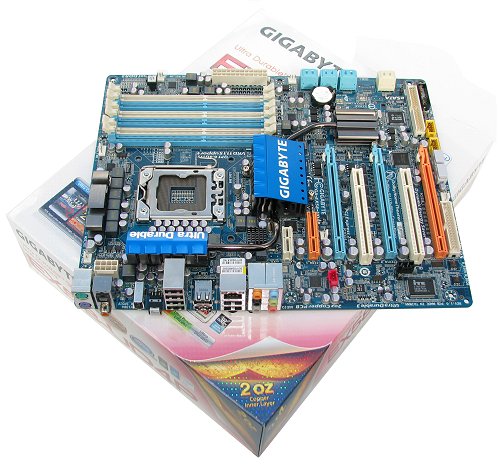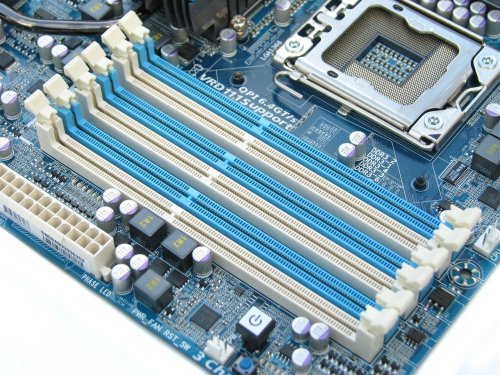Board Features & Specifications
The Gigabyte EX58-UD4P list of integrated peripherals includes Firewire, Gigabit LAN, 8-Channel audio that supports Dolby Home Theater, SATA RAID, Crossfire + SLI support, an advanced 12+2+2 power phase, and the list just goes on.

Memory support is no longer dictated by the motherboard as the memory controller has been relocated to the processor. Evidently the motherboard still has a say in how many DIMM slots it will support, and while it does set the memory frequency and voltage, they must work to the Core i7 specifications.
While the Intel pre-production motherboard that we originally used to test the Core i7 processors only featured four DIMM slots, the EX58-UD4P supports six. This makes it possible to use a pair of triple-channel memory modules for a maximum memory configuration of 24GB.
As things stand today Core i7 processors work with either DDR3-1066 or DDR3-1333 memory, however through overclocking the EX58-UD4P offers official support for DDR3-2100+ memory as well.

The Gigabyte EX58-UD4P features a total of three PCI Express 2.0 x16 slots, though only two of them can provide full x16 bandwidth. The third slot is limited to x8, which should still be enough for those wanting to go all the way with 3-way SLI or CrossfireX.



On that note, along with standard CrossfireX support, the EX58-UD4P supports 3-way SLI. The other Intel X58 board we have reviewed so far (Asus P6T Deluxe) only supported 2-way SLI despite of being slightly more expensive. Asus reserved 3-way SLI support for their flagship Rampage II Extreme motherboard, which guess what, also costs more.
Other expansion slots include two traditional PCI slots, a single PCI Express 2.0 x4 slot and a x1 slot, which should provide with more than adequate upgrade flexibility. Moving on to storage, the familiar ICH10R south bridge provides support for six SATA 3Gb/s ports.


The JMicron controller also adds a single IDE channel and two SATA ports. The ICH10R south bridge does not support IDE and therefore Gigabyte has added this aging technology to the EX58-UD4P for those that might need it. Honestly, on such a cutting edge piece of technology we do not see the need for IDE support.

Another chipset feature is the Intel High Definition Audio (Intel HD Audio). This provides eight independent DMA audio engines that support multiple audio streams with audio codecs. Driving this feature is the Realtek ALC889A codec, enabling high-quality 192KHz/24-bit audio output.

The EX58-UD4P supports IEEE1394a (FireWire 400) useful for bandwidth-intensive applications like digital video (DV), professional audio, and external hard drives, which often consume hundreds or even thousands of megabytes of data per file. The board provides two 1394a ports due to the inclusion of the T.I. TSB43AB23 FireWire controller. The more obvious USB 2.0 support comes from the ICH10R chipset, and therefore the EX58-UD4P supports a total of twelve ports (8 on the I/O panel + 4 additional using the supplied brackets).
The EX58-UD4P features a single Realtek 8111D Gigabit LAN controller which uses the PCI Express bus for maximum throughput. Those wanting dual Gigabyte LAN controllers will need to spend around $300 on a Gigabyte X58 motherboard, though we suspect that most users will be more than happy with a single controller.